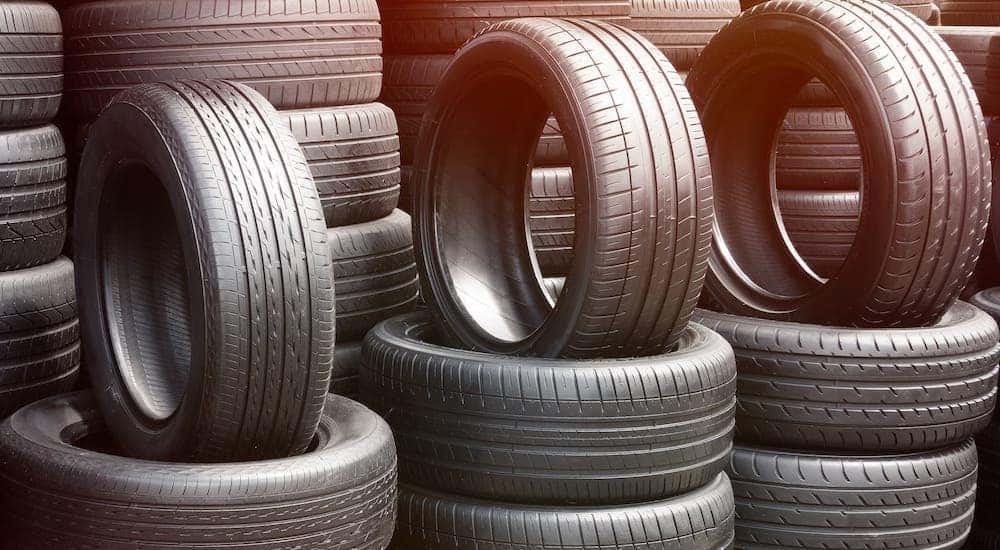Tire Service: Comprehending Tire Pressure Monitoring Systems
Recognizing Tire Pressure Surveillance Systems (TPMS) is an important element of keeping optimal lorry efficiency and safety when traveling. With improvements in automobile technology, TPMS has ended up being a typical function in modern vehicles, offering real-time information on tire stress levels. Digging deeper right into the complexities of TPMS, one can discover the different elements that compose this system and the significance of each in making certain exact surveillance. From straight to indirect TPMS systems, the landscape of tire pressure surveillance varies, each with its unique collection of advantages and factors to consider. Remain tuned to untangle the intricacies of TPMS, from upkeep tips to the obvious advantages of keeping your tires correctly inflated. tire shop morris.

Value of TPMS
The value of Tire Stress Surveillance Equipments (TPMS) hinges on their capacity to boost car safety and performance with real-time surveillance of tire stress levels. Keeping the proper tire pressure is crucial for ensuring optimum handling, stopping, and general security of a lorry. TPMS offers chauffeurs with immediate feedback on any kind of underinflated or overinflated tires, enabling timely adjustments to be made.
Parts of TPMS
Consisting of numerous crucial aspects, a Tire Pressure Monitoring System (TPMS) works as an advanced safety and security attribute in modern lorries. The major parts of a TPMS consist of sensing units, a control component, and a warning indicator. Sensors are normally situated in the tire valve stem or attached to the wheel setting up, where they gauge tire pressure and transfer information to the control module. If it identifies dramatically low pressure in any of the tires, the control module procedures this details and triggers a caution. The warning indicator, typically a sign on the control panel, alerts the chauffeur to check the damaged tire or tires. Some advanced TPMS designs also show the actual tire pressure readings for each tire, providing vehicle drivers with real-time details to make sure ideal tire performance and safety. By keeping an eye on tire pressure continually, TPMS aids avoid accidents, minimizes tire wear, and boosts fuel performance, making it an essential element for lorry safety and efficiency.
Kinds of TPMS

On the various other hand, indirect TPMS relies upon the vehicle's wheel rate sensing units to keep track of tire pressure. This system discovers underinflation by comparing the rotational speeds of the wheels. Indirect TPMS is less expensive than direct TPMS, as it utilizes existing sensing units within the vehicle.
While direct TPMS offers much more exact analyses, indirect TPMS is less complex in style and normally needs less maintenance. Both systems have their constraints and my blog benefits, and the choice in between them usually relies on elements such as cost, automobile make, and individual choice. Comprehending the differences between these two sorts of TPMS can aid lorry proprietors make informed decisions pertaining to tire upkeep and security.
TPMS Upkeep Tips
Conduct regular checks on the tire stress degrees and compare them with the TPMS readings to ensure they are constant. During tire turning or substitute, make certain that the TPMS parts are managed carefully to protect against any kind of potential damages. If the TPMS advising light brightens on the control panel, address the concern without delay by inspecting the tire pressures and the overall system for any kind of faults.
Benefits of Appropriate Tire Stress
Keeping proper tire stress, as highlighted in TPMS Maintenance Tips, is crucial for reaping the countless advantages related to optimal tire pressure levels. One of the main benefits of maintaining the appropriate tire stress is boosted gas performance. When tires are correctly inflated, there is less rolling resistance, leading to much better fuel economic climate. Furthermore, appropriate tire stress makes sure even tire wear, expanding the life expectancy of the tires and promoting more secure driving problems. With the right tire stress, cars likewise have better handling and traction, especially in negative climate condition. This can enhance general driving efficiency internet and safety for the motorist and passengers. Keeping optimum tire pressure can contribute to a smoother and extra comfy trip by decreasing vibrations and sound caused by underinflated tires. In verdict, the advantages of proper tire pressure surpass just tire long life; they encompass boosted fuel efficiency, boosted safety, much better lorry efficiency, and overall driving convenience.
Verdict
To conclude, understanding tire pressure surveillance systems (TPMS) is important for keeping optimum tire stress and making sure lorry safety. By recognizing the value of TPMS, being acquainted with its components, recognizing the different types readily available, adhering to appropriate maintenance ideas, and realizing the advantages of maintaining proper tire pressure, chauffeurs can enhance their driving experience and prolong the lifespan of their tires. Proper tire stress is key to effective and safe car operation.
